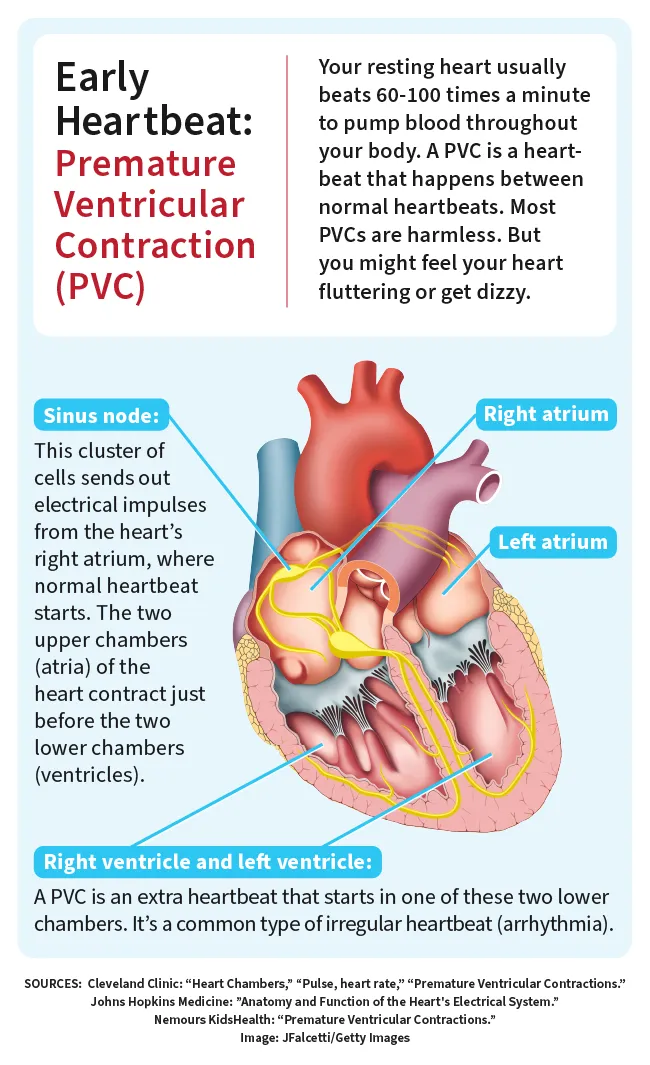What Are Premature Ventricular Contractions (PVCs)?
If your heart feels out of rhythm or “flutters,” especially when you're anxious or stressed, it could be caused by premature ventricular contractions (PVCs).
They're a common reason for arrhythmia, or an irregular heart rhythm. PVCs happen when the electrical signal to start your next heartbeat comes from a lower chamber of your heart, called a ventricle, instead of from the usual upper chamber.
Some of the other names for PVCs are:
- Premature ventricular complexes
- Ventricular premature beat
- Extrasystoles
When to worry about PVCs
PVCs aren't a reason to be concerned if you don't have heart disease or other health problems. In fact, most of us get them at some point. But if you have them often, it could signal a health problem or rarely, cause heart trouble.
PVCs vs. PACs
PVCs come from the lower chambers of your heart, the ventricles. A mistimed beat also can come from the top chambers of your heart, the atria. Those are called premature atrial contractions (PACs). Like PVCs, PACs are usually no cause for concern.

Premature Ventricular Contraction (PVC) Symptoms
If you get PVCs once in a while, you may feel like your heart “skipped a beat,” but that's not what happens. They actually cause an extra beat. You can blame the force of the beat after the PVC for that skipped-beat feeling.
If you get them more often, you may have more of a fluttering sensation. And if they happen enough to affect your heart's ability to pump blood, you may feel dizzy or weak.
Talk to your doctor if you've had any of those symptoms. They could be caused by harmless PVCs. Or they could be related to other conditions, such as:
- Anemia
- Anxiety
- Heart disease
- Infections
- Other heart rhythm problems
How many PVCs are normal in 24 hours?
There's a wide normal range. In a study of healthy young adults, half were found to have more than two PVCs a day, but 5% had more than 193 a day. Another study of older adults found almost all had at least one PVC a day, and that the typical rate was about two per hour. In general, PVCs increase with age and are more common in men than in women. Many people don't even notice them.
When PVCs happen much more often than usual, they can reduce the pumping power of the heart, leading to a condition called cardiomyopathy. There's no clear-cut number of PVCs that leads to that kind of damage. But some researchers put the high-risk range at 10,000 to 20,000 extra beats each day. Keep in mind that your heart normally beats about 100,000 times a day.
Premature Ventricular Contraction Causes
Your heart has four chambers that pump blood. The two on top are called atria, and the two on the bottom are called ventricles. Heartbeats are triggered by electrical charges that cause the four chambers to squeeze and pump blood. The first electrical signal in a normal heartbeat comes from the right upper chamber, or atrium. PVCs are extra heartbeats that start with an electrical signal in one of the ventricles.
If you have PVCs, your heartbeat pattern goes like this: normal heartbeat, extra beat (PVC), slight pause, and then a stronger-than-normal beat. That last beat has an extra kick because your heart fills with more blood during the pause.
PVC risk factors
Experts aren't sure what causes most PVCs. But certain triggers and health conditions may make PVCs more likely These include:
- High caffeine use
- High anxiety levels
- Too little sleep
- High levels of stress hormones
- Abnormal blood levels of magnesium, potassium, or calcium
- Smoking
- Alcohol use
- Recreational drug use
- Side effects from medications, including decongestants and antihistamines
- Cardiomyopathy
- Heart valve problems
- Heart attack
- Anemia
- Overactive thyroid (hyperthyroidism)
- High blood pressure
Your risk for PVCs also may be higher than usual if you are:
- Tall
- Male
- Older
- Not very active
- Part of a family with a history of PVCs or sudden heart death
Premature Ventricular Contraction Diagnosis
Even if you've never had symptoms, you may be diagnosed with PVCs during a routine heart test called an electrocardiogram (ECG). If you come in with symptoms of PVCs, you'll get the same test. During this test, sticky patches with sensors called electrodes are put on your chest. They record electrical impulses that travel through your heart.
The test only takes a few minutes, and that may not be long enough to notice an occasional PVC. In that case, you may get a portable ECG. There are two types:
- Holter monitor: A device you can carry in your pocket or wear on your belt. It records your heart's activity for a period of 24-48 hours.
- Event recorder: When you feel symptoms, you push a button to record your heart's activity so your doctor can see its rhythm during that time.
Another type of ECG is called an exercise stress test. It's like a standard ECG, but it's done while you're on a bike or a treadmill. If PVCs don't happen often during this test, that's a sign that they probably are harmless. If exercise seems to cause extra beats, you may be at a higher risk of other heart rhythm problems.
Other tests:
If you have a lot of PVCs or have had them for a long time, your doctors might order more tests to see if you have other conditions that might need attention. The tests might include:
- Blood tests to check your potassium and thyroid hormone levels
- MRI, CT, or ultrasound scans of your heart to look for any abnormalities
- An electrophysiological study to check your heart's electrical system
Premature Ventricular Contraction Complications
In most cases, PVCs have no complications. But if you have a lot or have certain patterns of PVCs, your heart muscle can get weaker over time. So, your heart might have trouble pumping enough blood through your body. In the worst case, that can lead to heart failure. However, treating the PVCs can reverse the problem.
In rare cases, people who have PVCs along with heart disease can develop dangerous heart rhythm problems that can lead to death.
Premature Ventricular Contractions Treatment
You probably don't need medical treatment for PVCs if they don't happen often and you don't have heart disease or other health conditions. But some lifestyle changes may help you control them: Limit caffeine, tobacco, and alcohol; get enough sleep; and manage your stress and anxiety.
If your PVCs are more serious or bothersome, you might need:
Medication.Blood pressure medications, including beta-blockers and calcium channel blockers, are sometimes prescribed for PVCs. You might also get a drug to control heart rhythms.
Radiofrequency catheter ablation. If lifestyle changes and medications don't work, your doctor might recommend this procedure in which a thin, flexible tube is threaded up through an artery to your heart. The tube has a tip that uses heat to make tiny scars that block unwanted electrical signals and stop the extra heartbeats.
If your PVCs are caused by heart disease or a problem with the structure of your heart, they may go away if those conditions are treated.
Outlook
The outlook for people with PVCs is usually good. Most people won't need treatment and won't have complications.
If you already have a weak heart muscle, are an older adult with heart disease, or have had a heart attack, you face more risks, including a higher-than-average chance of sudden cardiac arrest. That's when your heart suddenly stops beating. People with a very high number of PVCs can also develop a weak heart muscle. But, in those cases, treating the PVCs can reverse the damage.
Takeaways
An occasional heart flutter isn't anything to worry about. They're probably harmless premature ventricular contractions. But if you have a lot of these episodes or symptoms such as dizziness or weakness, talk to your doctor. If your PVCs are linked to a more serious problem, treatment can help.
Premature Ventricular Contractions FAQs
Are PVCs a serious heart condition?
For most people, PVCs are harmless and aren't linked to any serious heart problems. They usually do not affect your health.
Can PVCs be serious?
In a small number of cases, PVCs are signs that you have heart disease, a problem with the structure of your heart, or another health problem. Very frequent PVCs, estimated at 10,000 to 20,000 episodes a day, can weaken the heart muscle and increase the risk of heart failure if the condition isn't treated.
What's the most common cause of PVCs?
Most of the time, there's no known cause. However, many people notice they have more when they feel anxious or stressed or use caffeine.
Can PVCs be an emergency?
The usual symptoms of PVCs aren't emergencies. But you should call 911 or go to an emergency room if you have additional symptoms such as pain in your chest, shortness of breath, confusion, or passing out.

